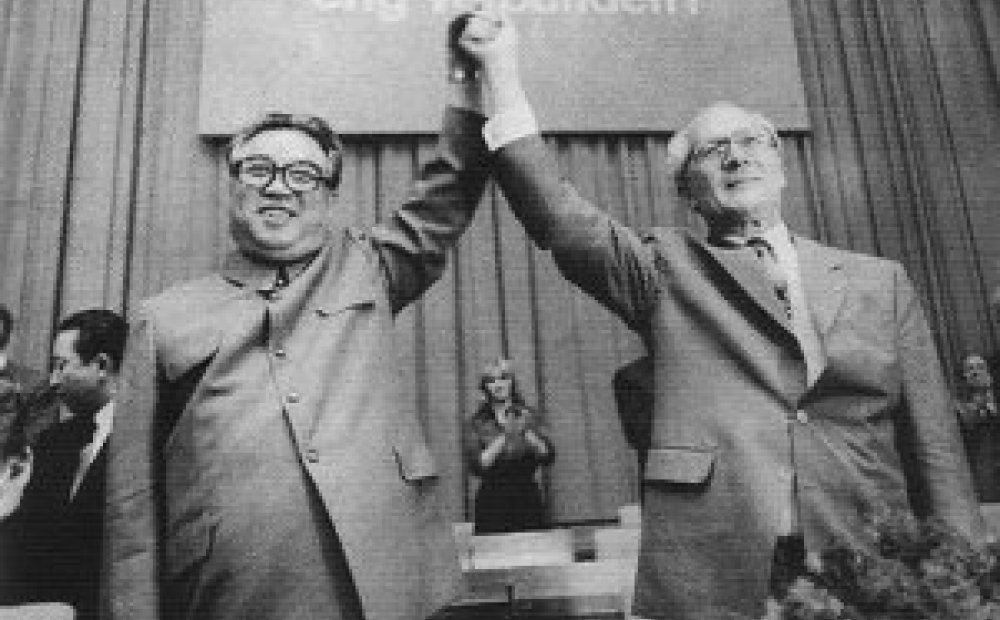Offsite Conference: “North Korea’s Cold War”

The North Korea International Documentation Project and The Ohio State University recently hosted an academic conference entitled North Korea’s Cold War.
Perhaps no country in the modern era has perplexed Western observers as much as North Korea, a nation whose extraordinary secrecy and internal repression has generally prevented scholars from exploring its Cold War experience. As a result, the country remains to many an enigma, a land of provocation and intrigue that is often criticized but rarely understood.
Then came the liquidation of the Soviet empire, and with it a torrent of new information from the archives of North Korea's former communist allies. Records from the embassies of Russia, East Germany, Poland, Romania, Albania, Hungary, and elsewhere, pulled back the curtain of secrecy that had long enshrouded North Korea, and for the first time allowed outsiders to begin to understand the policies of the "Hermit Kingdom."
By utilizing these materials, this conference will examine the inner workings and foreign relations of North Korea during the Cold War, and in doing so will open a virtually unparalleled window into the nation's use of force and diplomacy during the Cold War and beyond.
The conference was held Monday, February 27, 2012 at The Mershon Center for International Security Studies on the campus of The Ohio State University in Columbus, Ohio.
Visit the website of the Mershon Center for more information.
Program
8:45-9 a.m. -- Coffee and pastries in Mershon Center Lobby
9-9:30 a.m. -- Welcome Remarks (Mitch Lerner and James Person)
9:30-11:30 a.m. -- Panel I - North Korea in the 1970s
Chair: Christopher A. Reed, The Ohio State University
Charles Armstrong, Columbia University
Juche and North Korea's Global Aspirations
Bernd Schaefer, Woodrow Wilson International Center for Scholars, Washington, DC
Overconfidence Shattered: North Korean Reunification Policy, 1971-1975
Ryoo Kihl-jae, Kyungnam University, South Korea
The Development of the North Korean Political System, 1965-1974
11:45 a.m. - 12:45 p.m. -- Lunch
Marcus Noland, Peterson Institute for International Economics
Witness to Transformation: Refuge Insights Into North Korea
1-3 p.m. -- Panel II - North Korea in the 1960s
Chair: TBA
Gregg Brazinsky, George Washington University
China, North Korea, and the Third World in the 1960s
Mitchell Lerner, The Ohio State University
"Mostly Propaganda in Nature:" Kim Il Sung, the Juche Ideology, and the Second Korean War"
Yafeng Xia, Long Island University
The Arrogance of Certitude: Beijing's Grandiose Self-image and China's Deteriorating Relations with North Korea during the Cultural Revolution,1966-1969
Jooeun Kim, Georgetown University
The Origins of North Korea’s Brinkmanship Diplomacy
3-3:15 p.m. -- Break
3:15-5:00 p.m. -- Panel III - North Korea in the Early Cold War
Chair: Deborah Solomon, Otterbein University
Cheehyung Kim, Hanyang University
Post Korean War Socialist Order and North Korea’s Urban Reconstruction
James Person, History and Public Policy Program, Woodrow Wilson International Center for Scholars
From Anti-Formalism to
Self-Reliance: The Origins of North Korea's Juche Ideology, 1953-1956
Jongdae Shin, Kyungnam University, South Korea
The Response to the 1961 Park Chung-Hee coup
5-5:30 p.m. -- Closing Comments
Christian Ostermann, History and Public Policy Program, Woodrow Wilson International Center for Scholars
Hosted By

North Korea International Documentation Project
The North Korea International Documentation Project serves as an informational clearinghouse on North Korea for the scholarly and policymaking communities, disseminating documents on the DPRK from its former communist allies that provide valuable insight into the actions and nature of the North Korean state. Read more


Cold War International History Project
The Cold War International History Project supports the full and prompt release of historical materials by governments on all sides of the Cold War. Read more
